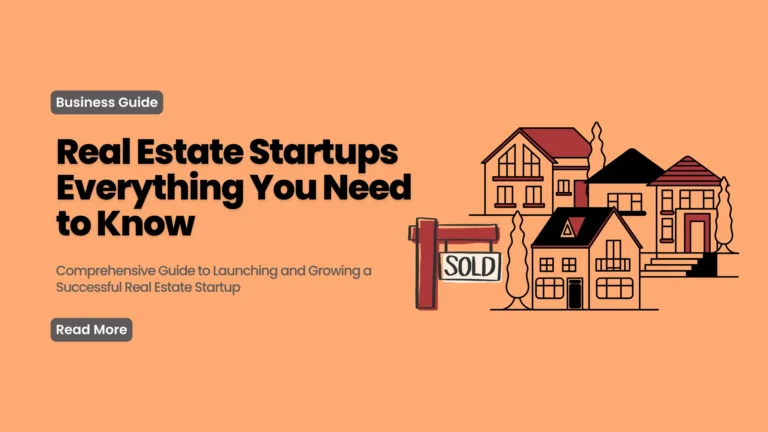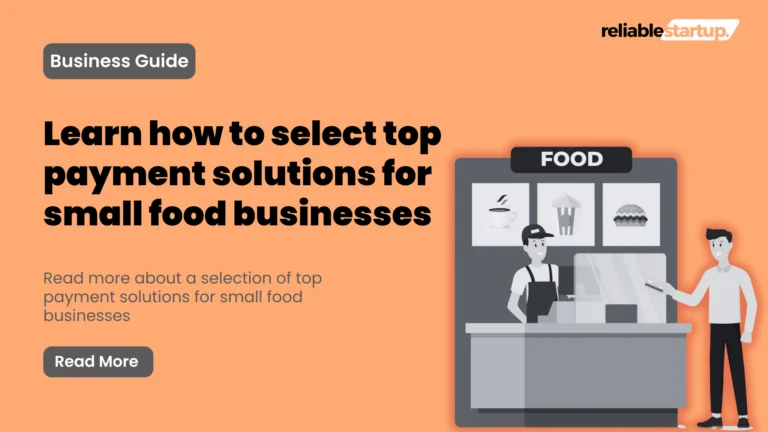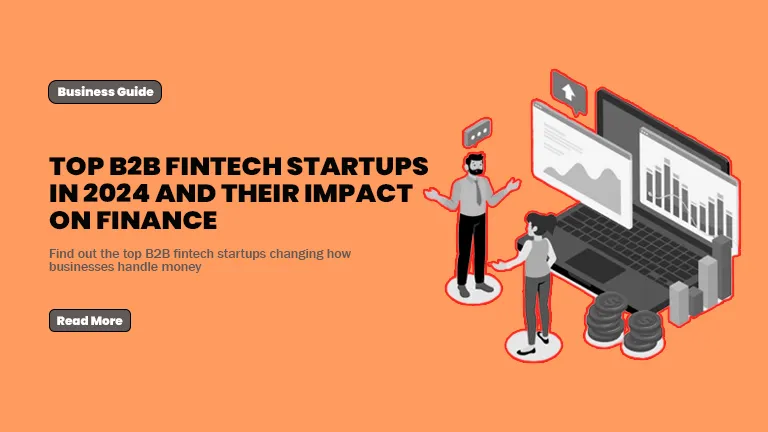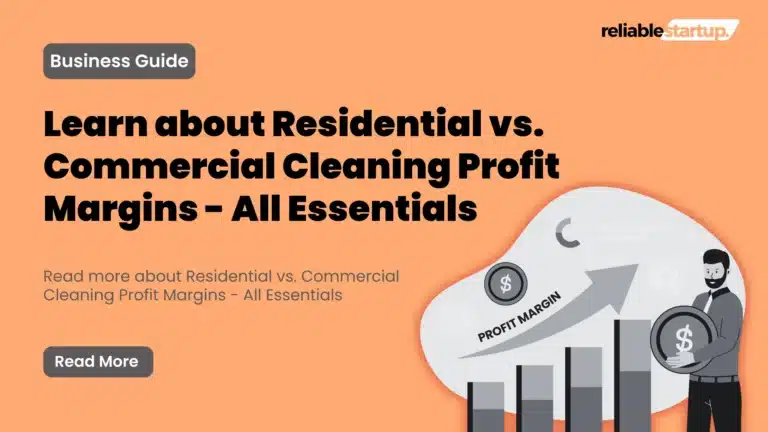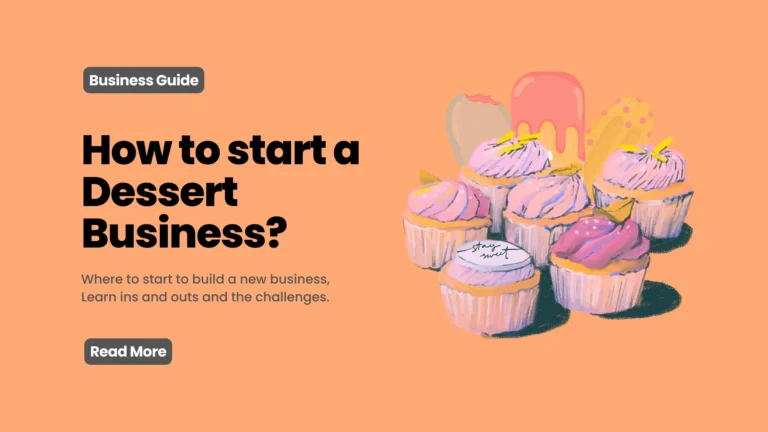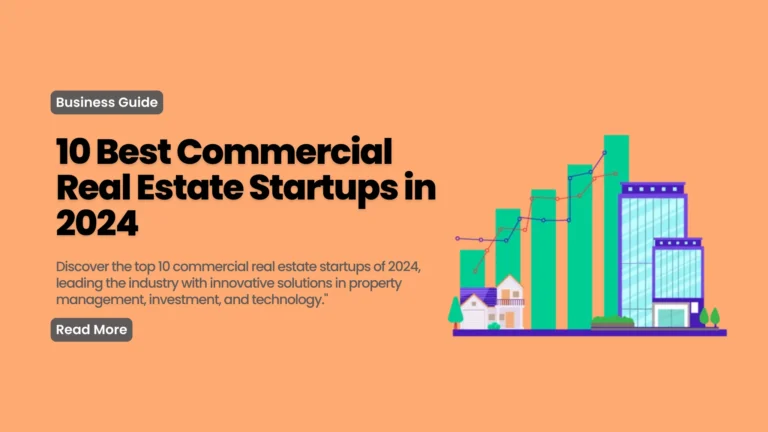10+ Profitable Music Business Ideas You Can Start Today
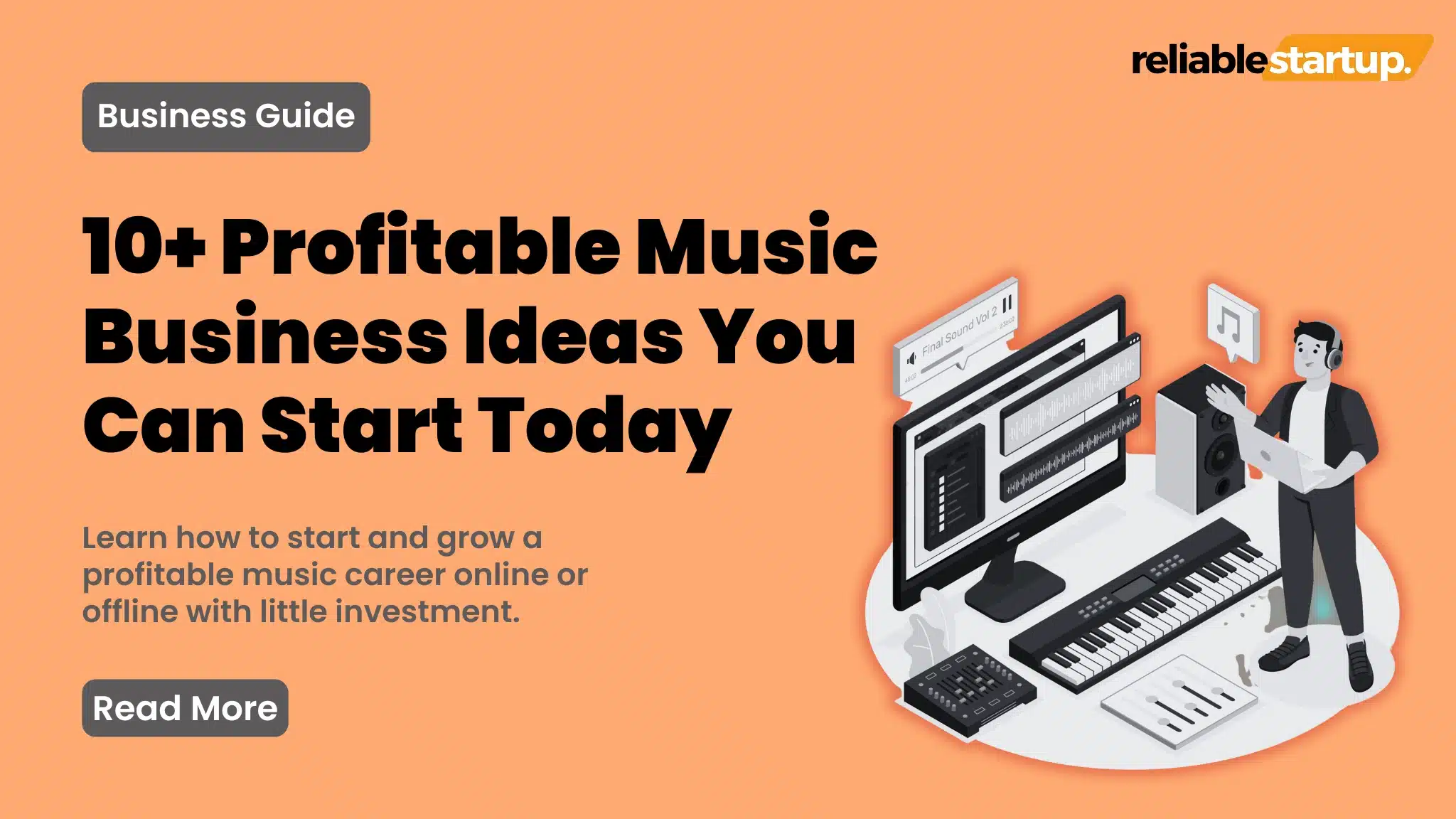
Love music? Why not make it your business?
The music industry has never been more open to creators. With platforms like YouTube, Spotify, and TikTok, anyone can share their sound, skills, or services and earn from it.
Whether you’re into teaching, producing, or simply passionate about music, there are real ways to turn that passion into profit.
In this post, you’ll discover 10+ music business ideas that are creative, practical, and easy to start. You don’t need a huge budget or a big audience, just the drive to begin.
Let’s explore how you can start your own music-based business today.
Why Start a Music-Based Business?
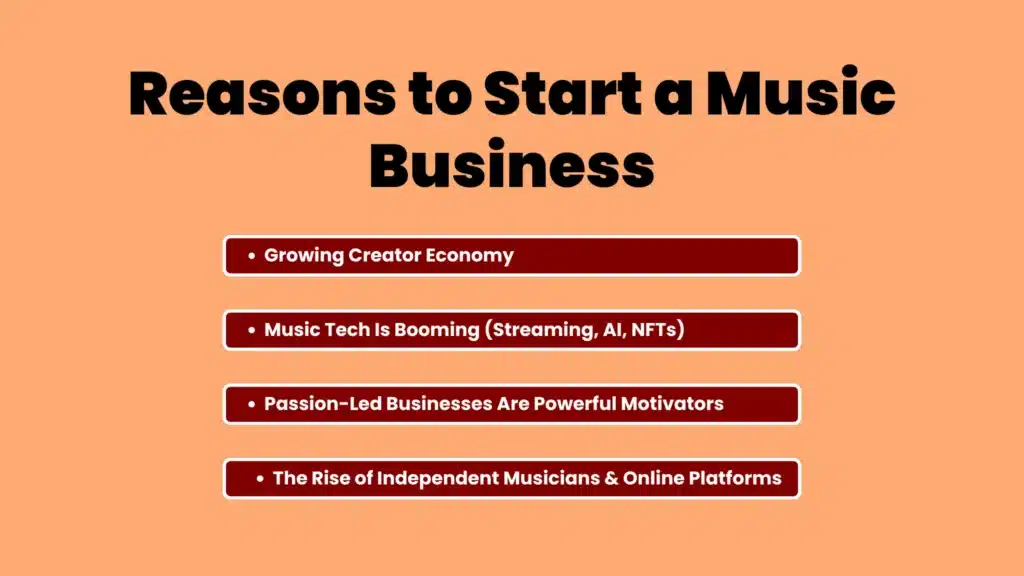
Due to the following reasons, you should start a music business:
1. Growing Creator Economy
The global creator economy reached $191.6 billion in 2025, growing at a compound annual rate of 22.5%, and is projected to exceed $528 billion by 2030
Moreover, over 200 million people worldwide now make money through content creation, half consider it their full-time job, and one in five has built a creator-powered business.
However, in 2025, creators are expected to earn around $185 billion directly from platforms, informed largely by advertising, sponsorships, and brand deals.
2. Music Tech Is Booming (Streaming, AI, NFTs)
Music streaming revenue surged from roughly $2.8 billion in 2015 to $30 billion by 2025, now making up about 84% of all recorded music income.
Also in 2023, 667 million users paid for music streaming services, generating over $12.3 billion, with ad-supported streaming adding another $4.6 billion.
In addition, AI in music is projected to grow market revenue by 17% over the next year. Tools like Landr, AIVA, MuseNet, and others are automating production and composition.
NFTs are being used by indie musicians to sell music rights and create collectible experiences, with platforms like Royal.io enabling artists like Nas and The Chainsmokers to offer royalty shares via NFTs.
You may also like to read: 10 Snack Bar Business Ideas—Easy to Start and Scale
3. Passion-Led Businesses Are Powerful Motivators
Around 500 million people worldwide are participating in the “passion economy,” turning hobbies and skills into livelihoods.
About 60% of creators earn enough from their content to live on, and 42% do this full-time, illustrating how passion can fuel sustainable businesses.
4. The Rise of Independent Musicians & Online Platforms
Independent artists increasingly depend on streaming and direct-to-fan sales rather than labels. Now, only 0.19% of Spotify artists earn over $50,000/year, highlighting the competitive yet possible path to success.
Moreover, major labels, like Sony Music, are investing heavily, over $2.5 billion in catalog acquisitions in 2024, while simultaneously exploring AI, notably working with 800+ firms to monetize rights through AI-enhanced use.
However, these numbers show the massive scale of the creator and music tech industries, how technology is transforming opportunity, and why passion-led, independent ventures are more viable than ever.
You may also read: 20 Business Ideas for Couples to Start Today
15 Best and Profitable Music Business Ideas
After researching multiple platforms and even discussion forums, we have compiled the following list for you to start your own music business today.
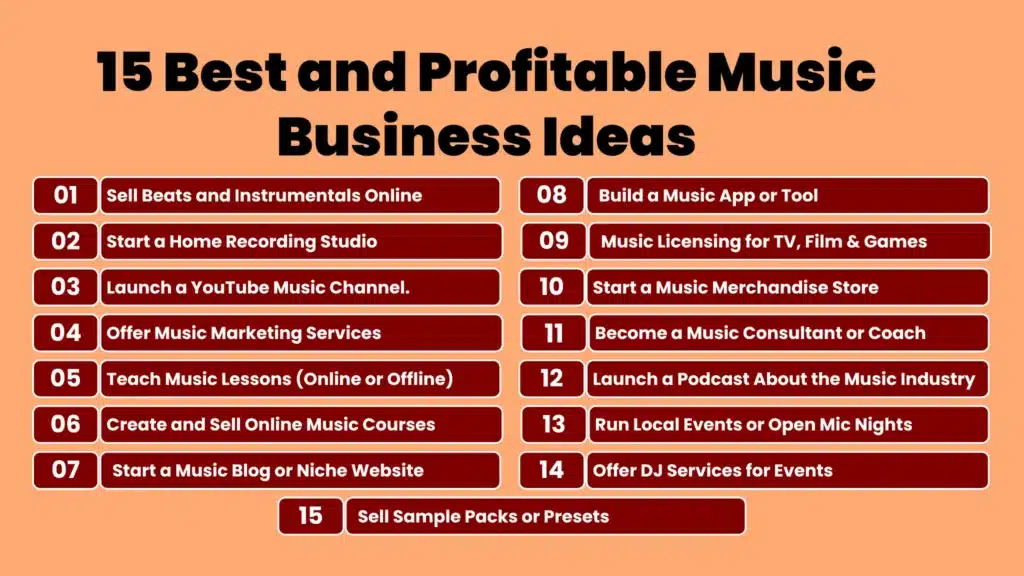
1. Sell Beats and Instrumentals Online
If you know how to produce music, selling beats is a great way to make money. Artists are always looking for fresh sounds, and many are willing to pay for exclusive or non-exclusive rights.
How to Start: Make your beats using software like FL Studio or Ableton. Then upload them to platforms like BeatStars or Airbit.
Where to Start: From home, using a laptop and a basic audio setup.
2. Start a Home Recording Studio
Many artists prefer recording in affordable, home-based studios rather than expensive professional ones. If you have recording skills and the right gear, this can become a steady business.
How to Start: Invest in a good mic, soundproofing, an interface, and a DAW. Market locally and offer services on social media or Fiverr.
Where to Start: A spare room or even a well-treated corner in your house.
You may also like to read: Top 10 Healthy Foods Companies in the United States
3. Launch a YouTube Music Channel
YouTube is still one of the best platforms for musicians and creators. You can earn from ads, sponsorships, or even fan support via Patreon.
How to Start: Choose a niche—covers, music tips, tutorials, or gear reviews. Record with your phone and improve gradually.
Where to Start: From home with an internet connection and basic recording gear.
4. Offer Music Marketing Services
Most independent artists don’t know how to market their music. If you know how to grow Spotify streams, design social content, or run ads, you can help them grow their audience.
How to Start: Learn music marketing basics (YouTube, Instagram, Spotify, etc.) and offer your service through a website or freelancing sites.
Where to Start: Online—All you need is a laptop and some marketing skills.
5. Teach Music Lessons (Online or Offline)
If you can play an instrument or sing, you can teach others — kids, beginners, or even adults who want to learn for fun.
How to Start: Offer lessons in person locally or teach online via Zoom. Use platforms like TakeLessons, Preply, or your own website.
Where to Start: From your home, the student’s home, or online.
6. Create and Sell Online Music Courses
Instead of teaching live, turn your skills into recorded lessons and sell them again and again. This is a great way to earn passive income.
How to Start: Pick a topic you’re good at (e.g., “Guitar for Beginners”), record step-by-step videos, and upload to Udemy, Skillshare, or your own site
Where to Start: Anywhere—just need a camera and mic.
7. Start a Music Blog or Niche Website
If you love writing and music, you can create a blog where you share music tips, reviews, or interviews. Blogs make money through ads, affiliate links, or brand partnerships.
How to Start: Use platforms like WordPress or Wix. Focus on a specific angle (e.g., “music production tips” or “indie music news”).
Where to Start: Completely online—write from anywhere.
8. Build a Music App or Tool
If you have tech skills (or a partner who does), music-related apps are in demand—like beat makers, chord tools, or AI song generators.
How to Start: Brainstorm a problem musicians face, then design a simple app that solves it. Use platforms like Glide or Bubble for no-code building.
Where to Start: Online—great for developers or creative tech enthusiasts.
9. Music Licensing for TV, Film & Games
Production companies need music for shows, ads, and video games. If you compose music or have a music catalog, licensing can be highly profitable.
How to Start: Sign up with sync licensing platforms like AudioJungle, Pond5, or Artlist. Upload your original tracks and apply for placements.
Where to Start: Anywhere—even a basic home studio works.
10. Start a Music Merchandise Store
Musicians and bands often need branded merch. You can either create your own music merch or design and sell it for others.
How to Start: Use print-on-demand platforms like Printful or Teespring to sell shirts, hoodies, or stickers. No inventory needed.
Where to Start: Online — you can launch a store within hours.
You may also read: How to Offer a Green Cleaning Service in 2025- A Complete Guide
11. Become a Music Consultant or Coach
Many artists need career advice, branding tips, or help planning a music release. If you’ve been in the industry or have business experience, this is for you.
How to Start: Offer one-on-one sessions or packages. Market through LinkedIn, Instagram, or music communities.
Where to Start: Online or in-person—depends on your audience.
12. Launch a Podcast About the Music Industry
Podcasts are a growing way to share insights and build an audience. You can interview artists, producers, or discuss trends in the music business.
How to Start: Use tools like Spotify for Podcasters or Anchor. Keep it simple with a mic and basic editing software.
Where to Start: From home, a quiet room, or even your car!
13. Run Local Events or Open Mic Nights
Events bring musicians and fans together. You can charge a small entry fee or partner with local venues and sponsors.
How to Start: Find a café, bar, or small hall. Set up a recurring music night, promote it locally, and feature local talent.
Where to Start: In your town or city—ideal for those who enjoy community work.
14. Offer DJ Services for Events
From weddings to birthdays, DJs are always in demand. It’s a fun and profitable gig once you have your basic gear.
How to Start: Buy beginner DJ equipment, build a playlist, and market your service locally or on sites like Thumbtack.
Where to Start: Local events, clubs, weddings, or private parties.
15. Sell Sample Packs or Presets
If you love sound design or music production, create sound packs others can use in their songs. It’s great passive income.
How to Start: Make high-quality samples or synth presets. Sell them on marketplaces like Splice, Gumroad, or your own website.
Where to Start: Online—perfect for producers and beatmakers.
You must also read: Unique and Cheap Home Business Ideas for Moms to Start
Tips to Start A Music Business
So you’ve picked a music business idea you like; now what? We get the answer for you.
Here are some simple but powerful tips to help you get off the ground and build momentum.
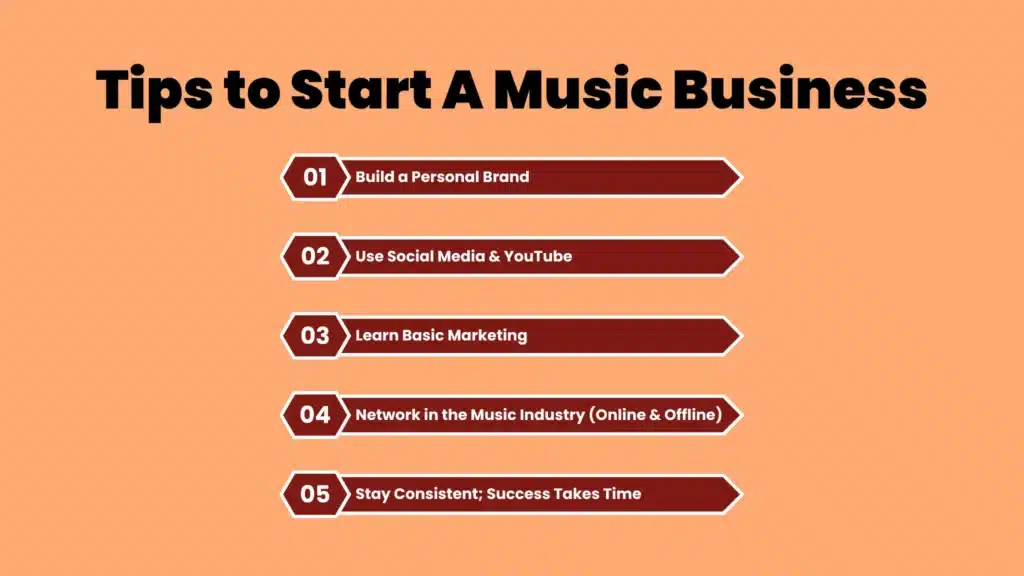
1. Build a Personal Brand
Your brand is more than just a logo or stage name. Instead, it’s how people remember you.
Think about what makes you different: your sound, your vibe, and your message. Use the same colors, style, and tone across your social media, website, and music.
Whether you’re a beatmaker, teacher, or performer, having a clear brand helps people trust and follow you.
2. Use Social Media & YouTube
Platforms like Instagram, TikTok, and YouTube are free tools that can bring you fans, clients, and sales.
So try to post behind-the-scenes clips, music tips, mini performances, or day-in-the-life videos. You don’t need to go viral, but just show up and connect with people.
Be real and helpful, and your audience will grow over time.
3. Learn Basic Marketing
It’s ok that you don’t know full marketing, but it’s not ok if you don’t know how to market your own brand.
That’s why you should learn how to write good captions, use hashtags, build an email list, and talk about your services in a way that gets attention. There are tons of free tutorials on YouTube and blogs to get you started.
4. Network in the Music Industry (Online & Offline)
Relationships are everything in music.
Talk to other artists, producers, and creators online or in your local area. Join Facebook groups, attend music events, or comment on other people’s posts.
Real connections can lead to collaborations, gigs, and new opportunities.
You must also read: 17 Low-Cost Business Ideas That You Can Start Today
5. Stay Consistent; Success Takes Time
You won’t succeed in the first few months. It takes time to build your brand.
You might not see big results in the first few weeks or even months, and that’s totally normal.
But just keep learning, improving, and putting yourself out there. If you stick with it, good things will come.
Final Thoughts
So now you know what the best music business ideas are in 2025. But remember every business takes time; you just need to stay consistent and keep patient. As it takes time to build your brand and make connections in the music industry.
So pick a music business idea from the above list and start this week.
However, do you want to explore other business ideas? Explore our other blogs as well.
FAQs
-
Is the music business profitable?
Yes, the music business can be highly profitable with the right niche, consistency, and monetization strategy.
-
What are sound business ideas?
Sound business ideas are practical, low-risk, and proven concepts with clear demand and profit potential.
-
What is a sound business plan?
A sound business plan clearly outlines your goals, target audience, marketing strategy, and how you’ll make money.
-
What are some online music business ideas I can start from home?
Great options include selling beats, creating music courses, running a music blog, offering consulting, or starting a podcast or YouTube channel.
-
How long does it take to make money in the music business?
It varies. Some people see results in a few months, while others take a year or more. The key is staying consistent and offering real value to your audience.
-
What’s the difference between a music business and being an artist?
Being an artist focuses on making music. A music business is about using your skills to earn, whether by teaching, producing, selling products, or helping others grow.

